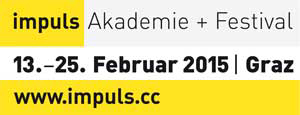Alles zum Thema:
2/2014 Shakespeare im zeitgenössischen Musiktheater
"I am writing what I want to write."
Interview with British composer Emily Howard
INTERVIEW
Axel Petri-Preis
studierte Musikerziehung, Germanistik und Musikwissenschaft in Wien. Musikerzieher, Autor von musikwiss. Texten und Einführungstexten und Dramaturg (Neue Oper Wien). Leiter der Musikvermittlung und redaktioneller Leiter von terz.
Staff favorites
Axel Petri-Preis met the young British composer Emily Howard at Café Heumarkt in Vienna. They talked about the British contemporary music scene, her interest in natural science and her meeting with participants of the youth workshop "Great! Britain!".
terz: Is this your first visit to Vienna?
Howard: No, I've been here several times before. For three years I have been involved in SOUNDINGS, the London Austrian Cultural Forum's wonderful exchange programme for young composers from Austria and the UK initiated by Andrea Rauter. At SOUNDINGS, there has been a real opportunity to spend time with composers and performers – including The Fidelio Trio and Lore Lixenberg – through a series of workshops, concerts and discussions. This way, I feel as though I have made a real connection with the Austrian contemporary music scene – getting to know the music and the people, for example composers such as Gerald Resch, Johannes Maria Staud and Joanna Wozny. In 2009 SOUNDINGS came to Vienna, and this was my first visit. Some of my music was performed in the "Alte Schmiede". I was here last year too. I came to the WIEN MODERN festival, which I think has a very open and friendly atmosphere.
terz: What does it mean for you to be one of the main composers at WIEN MODERN?
Howard: A lot! I am delighted that WIEN MODERN has invited me to be part of their British focus and I think it's a real honor. And for me, the "Wiener Musikverein" is an absolutely legendary venue. To have your music performed there and at the "Wiener Konzerthaus" is sort of a composer’s dream. (laughs) I love to write for orchestra and I am delighted to have received a WIEN MODERN commission for the ORF RSO Wien and I'm excited about the upcoming premiere of Calculus of the Nervous System.
terz: You already mentioned that you are part of the WIEN MODERN focus on British composers. Do you see yourself explicitly as a British composer?
Howard: No. (laughs) It’s a funny thing. I mean, yes in one way, because I am British. There's no getting away from that. But no in the sense that I wouldn't sit down to compose something that is specifically nationalistic British music. That's not on my mind when I write. I live in Manchester where composers Sir Harrison Birtwistle, Sir Peter Maxwell Davies and Alexander Goehr formed the New Manchester Group. I studied composition at the Royal Northern College of Music – where they studied before it was renamed – and now I teach there. And so I have that in common with the current grandfathers of British Music.
terz: Do you see yourself in a line of tradition with these composers?
Howard: I am not sure if I am the right person to ask. Perhaps it might make more sense to ask a musicologist in ten, twenty years when I’ve had a chance to write more!
terz: Let me rephrase the question. Are Sir Harrison Birtwistle and Sir Peter Maxwell Davies a big source of inspiration for your music?
Howard: Definitely, but no more so than say the music of Gustav Mahler or Franz Schubert. There are many composers from throughout history who I admire, and who have influenced me. But yes, I'm especially drawn to the dramatic nature of Birtwistle's music. And since my own work is heavily influenced by mathematics, I admire Maxwell Davies and his use of magic squares.
terz: Aside from composition you also studied mathematics and computation. Does that have an impact on your work?
Howard: For me, composition is very much about the physical shape of sound and I think this comes directly from studying mathematics. Before studying composition, I studied mathematics and computation as an undergraduate at Oxford University, and so many of the techniques that I apply to musical material stem from mathematical concepts. The structure of my music is extremely important to me and I think of it in terms of physical shape, dramatic shape – as if it were a graph. Processes and the breaking of processes are also important in my music – often processes related to computational algorithms. The work of Ada Lovelace, pioneering mathematician and daughter of the poet Lord Byron, is of great interest to me. Her notes on Charles Babbage’s Analytical Engine have been heralded as a forerunner of computer programming. The new ORF RSO Wien work Calculus of the Nervous System takes as its starting point the work of Ada Lovelace in developing a mathematical model for how the brain gives rise to thought and nerves to feelings.
terz: As I can see from many of your work titles, for example Solar orMagnetite, you are very much into natural sciences.
Howard: I am very interested in science, and in both of the works that you mention above, magnetism was a source of inspiration, a starting point for composition. The idea of magnetism has been translated into my music in many ways, structurally and on a more local level: an example of this being that 'events' in the music are attracted to each other or repelled by each other. But it is never literal – I wouldn't want anyone to think that it is my intention to replicate the science. And I find that I am just as interested in the human myths that surround science as the science itself.
terz: And that might be a connection to Sir Harrison Birtwistle, whose work is strongly influenced by myth.
Howard: Yes, that's true.
terz: In your program note for Magnetite you write that you do not only draw on the physical structure of the mineral but that you are also inspired by the superstitious beliefs that surround lodestone. Is it something you are trying to achieve in your music, to combine reason and emotion?
Howard: I think so, definitely. And that's probably why I am so interested in the character Ada Lovelace. The new orchestral pieceCalculus of the Nervous System, Mesmerism, a work for piano and chamber orchestra composed earlier this year and the dramatic vocal work Ada sketches II are all linked by Ada Lovelace. Her scientific interests existed side-by-side with more Byronic traits: the 'enchantress of numbers' suffered from depression; was accused of being hysterical, even a nymphomaniac and dabbled in both mesmerism and magnetism amongst other things.
terz: Let me just shortly come back to my question about reason and emotion. When describing your music the press uses expressions like "strangely beautiful", "surprisingly melodious", "ear-catching harmonies", "sensuous", "appeals to both hearts and minds". These attributes sound unfamiliar in the context of contemporary music. You don't seem to be afraid of writing emotional, at times even tonal music. Are you deliberately breaking with Avantgarde ideas?
Howard: Do these attributes sound unfamiliar in the context of contemporary music? Perhaps more so on the continent. I have not experienced this (yet!) in the UK, but then I believe that the British music scene is very diverse. And there is such a mix of influences and attitudes, from Europe and also the US. I think it is a very healthy musical environment to be part of and all I can do is write the music I want to write at that time. I don't feel pressured into anything.
terz: In the course of WIEN MODERN you are going to meet the participants of the youth workshop "Great! Britain!". Have you been involved in youth workshops so far?
Howard: I've often been involved with youth workshops in the UK. I am certain that if you are introduced to contemporary music when you are very young, you are more likely to be interested in contemporary music concerts when you are older and this can only be a good thing! Usually, I don’t speak about my own music: often I speak about composers like Stravinsky or Mahler or more recently, Berio and Rihm. I consider it to be a good way to meet a lot of people and to tell them about something that interests me so much. In the UK, I know several orchestral musicians who have said that if they hadn’t had somebody coming into school to talk to them about the violin, for example, they would never be doing what they are doing now.
LINKS:





